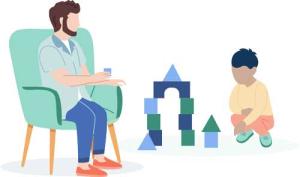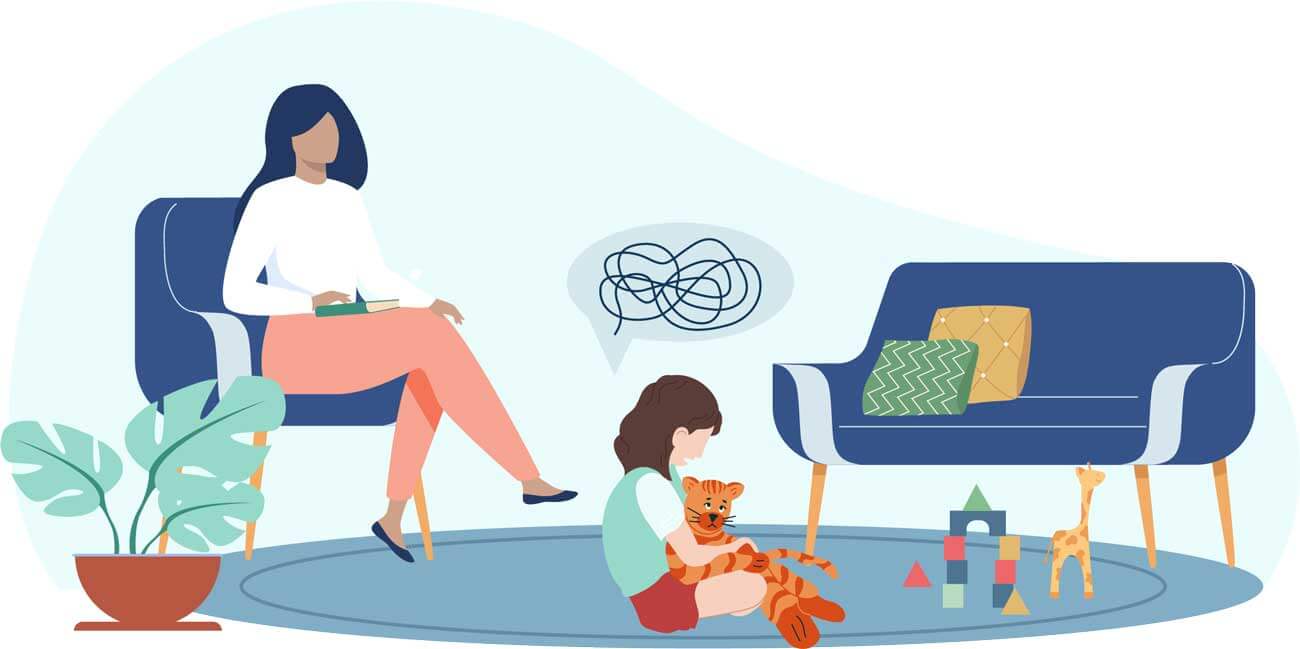Children learn through play. They learn to express themselves, make decisions, and interact with others, all before they even speak a single word. As a result, playtime is much more than the simple act of amusing oneself: it's one of the most effective ways young children have to communicate.
However, for children navigating difficult situations, childhood trauma, and adverse childhood experiences (ACES), playtime can be an entry point for healing. In fact, an entire branch of therapy has sprung up around this concept: child-centered play therapy. Here’s what you should know about play therapy.
What is Play Therapy?

It is a type of therapy that allows children to express themselves through play. It takes place in the presence of a trained mental health professional and is designed to help a child process their experiences, understand their emotions, manage relationships, and build self-esteem. Play therapists combine play, art, and a tailored approach to help children foster emotional well-being and develop coping skills. Since a child can’t express themselves the way an adult would, play therapy encourages the therapist to join the child in their world, on their level. While play therapy largely refers to a mental health application, it can also be used to support academics and relationships with parents and teachers.
Why Play?
Play brings us joy no matter our age and is essential to human happiness. It relieves stress and boredom, allows us to connect to others, and sparks creative thinking and exploration. And when it comes to children, it is the primary language in which they can speak.
Sometimes, a child’s feelings extend beyond what they can explain through words. Using toys, play therapists can build on the natural way children learn about themselves and those around them. This also allows children to express their feelings and thoughts in a way that is aligned with their social, emotional, and cognitive developmental stage.
Here are just a few scenarios a child may be experiencing in which play therapy can be beneficial:
- Divorce
- Grief
- Illness
- Bullying
- Emotional or physical abuse
- War
- Anxiety
For children with behavioral or anger problems, play therapy can also be instructive in teaching regulating behaviors.
How does play therapy work?

First, play therapy takes place with a trained play therapist. These are licensed and credentialed mental health practitioners who are trained in child development, assessing and understanding children’s mental health, and the fundamentals of play therapy.
Next, play therapy takes place in a comfortable, welcoming playroom designed to encourage a child's free expression. Few rules are imposed, allowing children to explore their emotions openly. Dr. Maggie Parker, a registered play therapist and associate professor at George Washington University, explains, “Limits on children’s play focus on protecting the toys, the relationship, the child, and the therapist. However, it is important to recognize that limits should not be set, until limits are needed.” The carefully selected toys in the room, ranging from dolls and stuffed animals to puppets, costumes and art supplies, are chosen to promote emotional expression and represent various relationships, emotions, and situations.
Play therapists may start the session by explaining to the child that they are welcome to play with the toys however they like. The child may create families with stuffed animals, bury superheroes in the sand, or create art representing their internal struggles. Some therapists may introduce a prompt, such as, “Create a picture of your classroom with everyone doing something.” In turn, the play therapist pays close attention to what choices the child makes: the toys selected, the child’s emotional expression, and the potential meaning of their play.

Dr. Parker states, “Just like with adults, the relationship between the play therapist and child is important. When a child feels safe with the therapist, they can explore the room and begin to play out what they are experiencing. The toys provide an added layer of safety, as they do not have to verbalize what they are struggling with. Instead they process through their play.” By observing the child at play, the therapist can conceptualize what the child is experiencing, provide suggestions for how parents and teachers can support the child’s individual needs, and identify milestones to reassess behaviors and goals.
The documented benefits of play therapy are extensive. Research has found that children who engage in child-centered play therapy have increased social emotional wellness, perform better academically, develop coping strategies and creative problem-solving skills, and improve their relationships with caregivers and teachers.
Who practices play therapy?
Play therapy is practiced in a variety of settings, including schools, community and private mental health clinics, and occasionally hospitals. Play therapists must be licensed professionals with a master’s or doctorate degree in mental health (i.e., licensed counselors, psychologists, school counselors, social workers, and more.)
How do you become a play therapist?
The path to becoming a mental health play therapist starts with completing a master’s or doctorate level degree in counseling, psychology, or social work from an accredited institution. Practitioners must have an active state license to provide clinical mental services, and must have completed a minimum of 150 hours of play therapy training under the supervision of a registered supervisor. These requirements are all centered and overseen by the Association for Play Therapy.
If working with children and making a powerful difference in their ability to communicate and navigate mental health challenges matches your career goals, becoming a play therapist may be the pathway for you. In the greater DMV area, the George Washington University is the only accredited institution that provides specialized training in play therapy within its master’s in school counseling program. Additionally, the university’s Community Counseling Services Center provides affordable play therapy services for families in the greater DMV area, while offering graduate students hands-on training toward their play therapy credentials.
Reach out to one of our admissions coaches to learn more about this career path.


